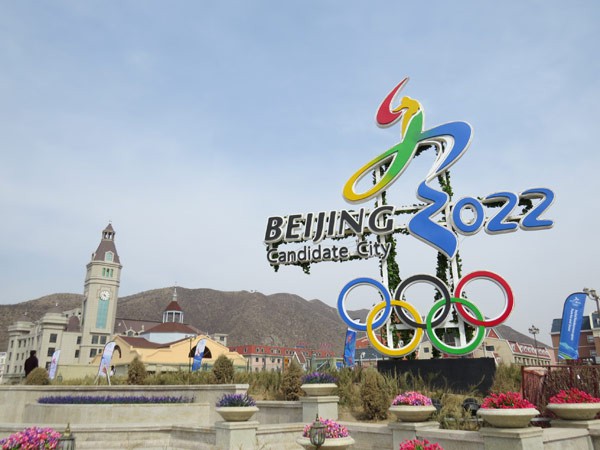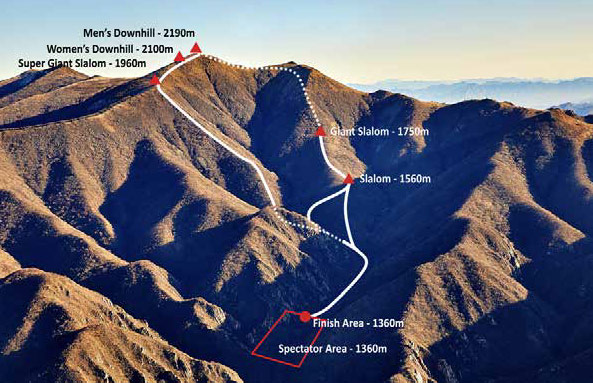
Reporting from the Olympic Museum in Lausanne, Switzerland – China’s Vice Premier Liu Yandong lead Beijing 2022 in its technical presentation to the International Olympic Committee (IOC) at the Olympic Museum in Lausanne Tuesday. In a statement she told the media “we shared all of our ideas on Beijing’s Bid for the Olympic Winter Games and fortunately all of our strengths were recognized by the IOC members. After this conversation with the IOC, we are now filled with even more confidence in our bid.”
The presentation closely followed that of Almaty and it has become evident that the IOC Agenda 2020 has left its footprint on the technical session as presenters have discussed more interactive, constructive dialog and many question that filled the budgeted 45 minutes given to both cities.
“I think they shared a lot between us – the discussion is very constructive, very helpful, it’s simply a great experience,” Zhang Li, Deputy Director of the Planning and Technology Department said after the presentation.
Li also shared that IOC members asked questions about the snow, or the lack thereof – an issue that was revealed when an evaluation report was released last week – as well as the environment and the high speed rail connection between three clusters in Beijing, Yanqing and Zhangjiakou.

“The Mayor answered questions about the environment and the cleaning up of the air in general,” said Yang Lan who is listed as the Deputy Director of the Project Management and Legal Affairs Department for Beijing 2022 but is known across China as a talk-show host and media mogul.
The IOC asked “13 questions or so,” she said.
However there were no questions about human rights issues that have been raised by many special interest groups, or about the vast distances between the clusters.
But Lan said “by hosting another Olympic Games it’s a great enhancement of human rights and social progress of China as a whole.”
Managing Partner in Diversity for PwC China, Zhou Xing – an expert in insurance, audit and risk management was on hand to field any questions regarding financial plans.
“We have done a great job and excellent teamwork,” she said, “we learn from each other.”
She said there were no financial questions raised by the IOC but they noted the budget was well-thought out and viable.
Also presenting was President of the Chinese Olympic Committee Liu Peng, President of Beijing 2022 and Mayor of Beijing Wang Anshun, IOC Vice President Yu Zaiqing and IOC Member and Olympic Champion Speed Skater Yang Yang.
Addressing the red marks on the IOC evaluation report, Zhang Li said that a plan to generate artificial snow for the venues requiring them has already been approved by the international federations and communicated to the IOC, and the environmental impact will be minimal as only 1% of the entire yearly water supply will be leveraged.
Liu Ping defended the clustered athletes’ village concept by explaining that it’s in accordance with Agenda 2020 by reusing the legacy of Beijing 2008 in the Beijing cluster, and creating new legacies for tourism in other clusters. In its report the IOC remarked that the separate villages could harm the athlete experience.
On air pollution, the Mayor of Zhangziakou said that air quality is already optimal in the snow cluster; for Beijing Mayor Anshun said that a plan and funds are in place for a long-term clean-up of air quality.

Ultimately, Beijing Mayor Anshun said that the Beijing 2022 Games offers the opportunity to “bring 300 million people into the fold of Olympic sports.” This number needs to be believed and realized in order to support Beijing’s legacy plans.
IOC President Thomas Bach said in a statement “Beijing showed excellent use of the 2008 legacy, and also plans to create a sporting legacy by giving more than 300 million Chinese access to winter sports.”
“Both presented very well balanced budgets, and both clearly demonstrated what they wanted to achieve, following Olympic Agenda 2020, by building their proposals into the long-term development plans of their city, region and country,” he said referring to both Beijing and Almaty.
Beijing’s on-stage delegation included four women and four men, potentially a strategic move to show diversity in contrast to male dominated delegations of the past.
In another thought out plan, young Chinese citizens who are currently living or traveling in Switzerland came to the Olympic Museum, which was open to the public during the presentations, to support the Beijing team. They were waving Chinese and Olympic flags and posed in pictures with some of the team, including the Vice Premier.
On Wednesday morning, Beijing and Almaty will meet with IOC members at the Hotel Lausanne Palace for one-on-one sessions to provide more bid details and answer questions.


